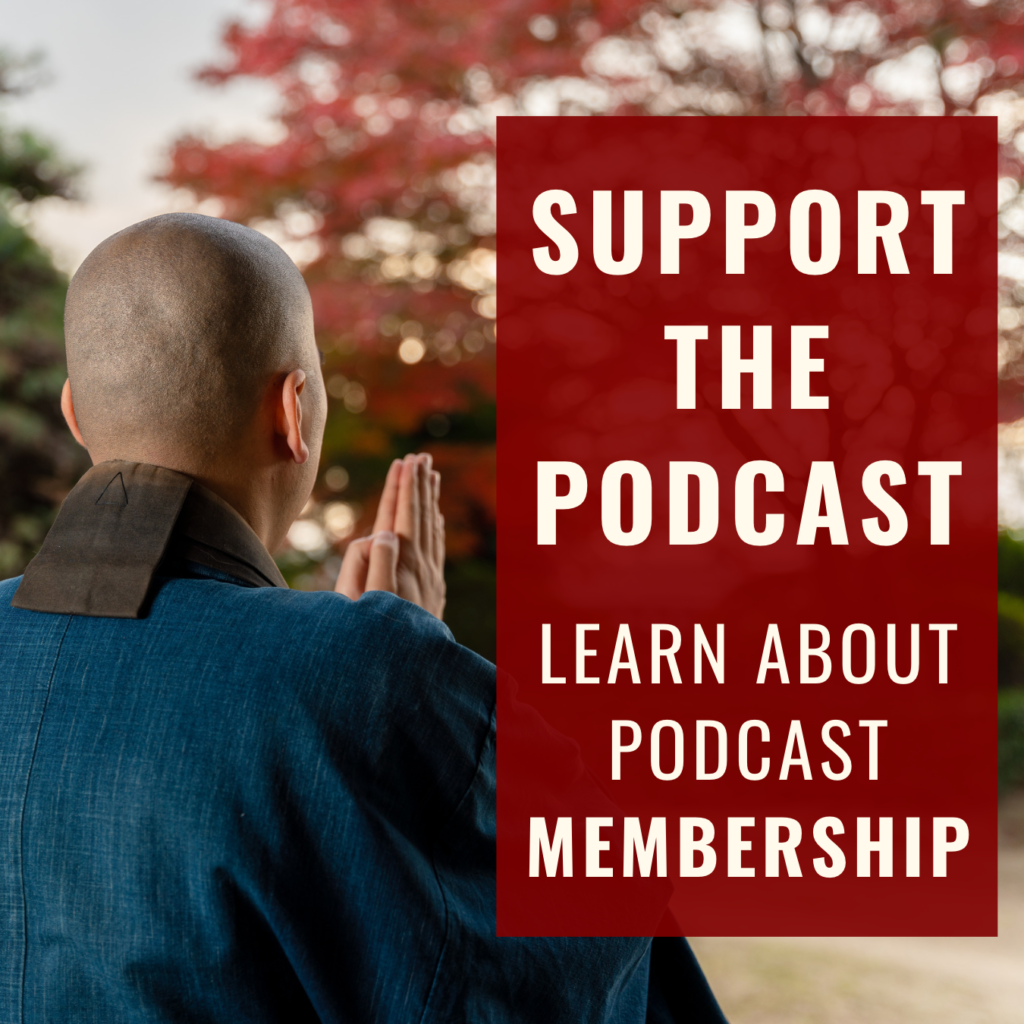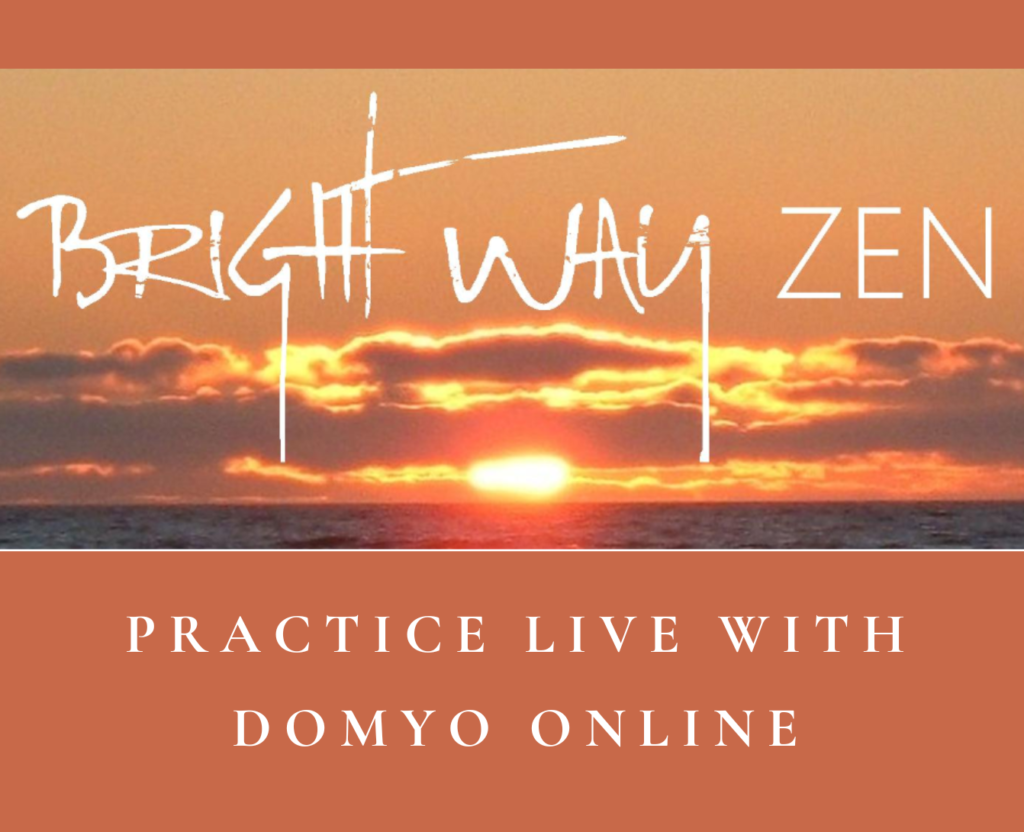What does Kosho Uchiyama mean in his book Opening the Hand of Thought, when he talks about “settling as universal life?” Isn’t the Zen emphasis on monastic practice and self-liberation at odds with the Bodhisattva Vow to free all beings? What can we learn from practicing with other Buddhist traditions than our own, and is this recommended if we don’t live near a Zen center? This is one of my unscripted Q&A episodes, where I answer questions submitted by listeners. If you have a question, go ahead and send it to me. Sorry – You’ll have to listen to the audio for my responses to the questions!
Uchiyama Roshi’s “Settling into Universal Life”
Terrance wrote:
I’d be interested in your thoughts on what Kosho Uchiyama means when he talks about “settling as universal life.” I’m referring specifically to his description of the four bodhisattva vows in Opening the Hand of Thought.
For reference, Uchiyama:
We need to remind ourselves of the clear distinction between personal, conditioned self and universal, original self. The personal self is what we usually think of as “I.” But if we peel away the skin of this individual, conditioned self, we lay bare the original, universal self. The personal self is always trying to fulfill its desires; this is the so-called karmic self. Human beings are born with brains, and we naturally have a tendency (or karma) that leads us to fabricate a maze of illusions in our minds. This is our individual self, but it’s a big mistake to assume that this self is the whole self. The whole self appears when we strip away karmic illusions. And that means “opening the hand of thought.” This is original, universal self… [Universal life = original self]
In our life as personal self, universal self is not something to yearn for, it is the direction toward which we should aim. This is the meaning of “vow.” The first of the four bodhisattva vows is “Sentient beings are innumerable, I vow to save them all.” This means to settle as universal life wherever that life naturally settles. The second vow is “Cravings are inexhaustible, I vow to extinguish them all.” This means refraining from being dragged around by one’s thoughts. But as long as we are human beings, we’re going to have a mind that fabricates illusions, and so we have to continuously study the buddhadharma to clarify the reality of our self. This is the meaning of the third vow, “Dharma teachings are limitless, I vow to learn them all.” The fourth vow is “The Buddha Way is endless, I vow to complete it.” With this, we vow to settle as the universal self.[i]
[Listen to audio for my response…]
Reconciling the Bodhisattva Vow with Monastic Practice
Matt wrote:
I have a question about the bodhisattva vow to save all living beings, and how it fits with the monastic tradition. I see the vow as a commitment to work for the good of others, for their liberation from suffering in all forms; and I understand it as an expression of interdependent origination, the lack of distinction between self and others. So why does the tradition emphasize the importance of monasticism? Isn’t this turning away from the suffering of others, in pursuit of personal liberation?
In the Platform Sutra, Huineng articulates the vow as to save “living beings within your own mind,” and parses “living beings” as all the negative kinds of thoughts one can have. Is this way of understanding “living beings” the traditional one? This strikes me as undermining the true meaning of the bodhisattva vow, but probably I am missing something.
Huineng for reference (The Sixth Patriarch’s Platform Sutra, translated by Red Pine):
“Good friends, as for ‘I vow to liberate all beings, no matter how numberless,’ it isn’t we who do the liberating. Good friends, the beings in our minds all liberate themselves with their own natures in their own bodies.
“What does it mean ‘they liberate themselves with their own natures?’ The mistaken views and afflictions, the ignorance and delusions within their material bodies already possess the nature of original enlightenment. It is just this nature of original enlightenment that liberates them by means of right views. Once beings realize the prajna wisdom of right views, they rid themselves of ignorance and delusion, and each being liberates themselves. The mistaken are liberated by means of the truth. The deluded are liberated by means of awareness. The ignorant are liberated by means of wisdom. The bad are liberated by means of goodness. And the afflicted are liberated by means of enlightenment. Those who are liberated in this manner are truly liberated.
“As for ‘I vow to end all afflictions, no matter how countless,’ this means to get rid of the delusions of your own mind. ‘I vow to master all teachings, no matter how limitless’ means to study the true, unsurpassed Dharma. And ‘I vow to complete the path to buddhahood, no matter how unachievable’ means always to practice with humility, to respect all beings, to avoid attachments, to give rise to prajna awareness, and to put an end to delusions. Thus the attainment of buddhahood through your own realization is the result of your vows.”[ii]
[Listen to audio for my response…]
Practicing with Other Buddhist Traditions

Tibetan Monastery in Khumjung, Nepal was established approximately 340 years ago.
Simon wrote:
I moved recently from Ohio to Washington state. In Ohio I practiced with a Zen group. Here in Washington, I have joined a Theravada sangha.
I have learned a huge amount about Buddhism in both of these traditions and sanghas. They overlap in many ways but also have their distinct characteristics.
I am curious to know whether you have practiced in other Buddhist traditions and how such experiences may have enhanced your own growth. Note: I am not asking which is best, rather I am intrigued to hear any insights of yours about how different Buddhist traditions can complement one another, especially as in this modern world they can be readily accessed by practitioners.
Dylan wrote:
Would it be beneficial to join a non-Zen Sangha if my interest is Zen? Right now, life doesn’t really allow for a Zen Sangha in my life, but there is a Tibetan centre nearby I could attend.
[Listen to audio for my response…]
Endnotes
[i] Uchiyama, Kōshō . Opening the Hand of Thought: Foundations of Zen Buddhist Practice (p. 154). Wisdom Publications. Kindle Edition.
[ii] Pine, Red. Zen Roots: The First Thousand Years (pp. 162-163). Catapult. Kindle Edition.
Photo Credit








